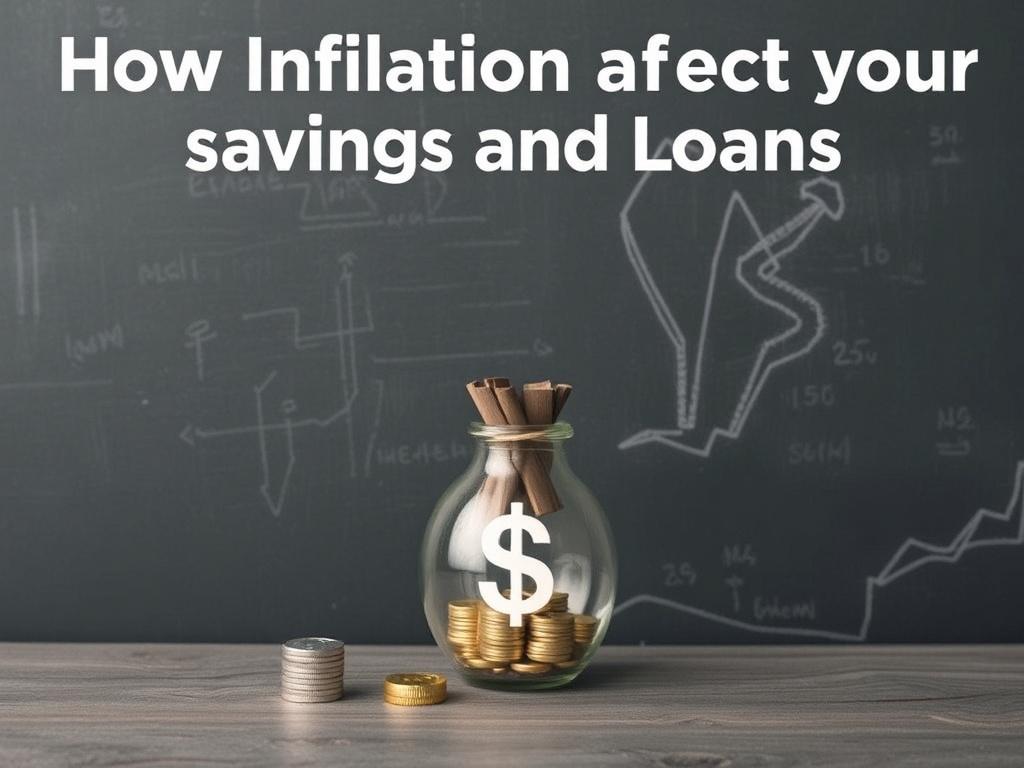SQLITE NOT INSTALLED
Inflation is a term that often comes up in everyday conversations about the economy, but many people don’t realize how it directly impacts their personal finances. Whether you have savings tucked away or loans you’re paying off, understanding inflation’s effects can help you make smarter financial decisions. Let’s explore step by step how inflation influences your savings and loans, what it means for your financial future, and how you can protect yourself against its less friendly side.
Содержание
What is Inflation and Why Does It Matter?
Inflation is the rise in prices of goods and services over time. When inflation is present, the purchasing power of your money decreases. In simpler terms, a dollar today won’t buy as much next year. This gradual increase in costs affects almost everything: groceries, utilities, transportation, and even the interest rates on your loans and savings. It’s something that silently erodes the value of your money if you’re not careful.
The Inflation Rate and Its Role
Inflation rates are usually expressed as a percentage, indicating how much prices have increased over a specific period, typically a year. For example, if inflation is 3%, something that cost $100 last year will cost $103 this year. Central banks, such as the Federal Reserve in the United States, closely monitor inflation because low and steady inflation is generally considered healthy for economic growth. However, when inflation rises too quickly or becomes unpredictable, it can cause serious financial strain for everyday people.
How Inflation Affects Savings

When you save money, you often think of it as a safe buffer for the future. But inflation can quietly chip away at the value of these savings. If your money’s interest earnings do not keep pace with the inflation rate, you are effectively losing money.
The Real Return on Savings
The “real return” is the interest rate you earn on your savings minus the inflation rate. Let’s say you have a savings account that pays 2% interest annually, but inflation is running at 3%. While your nominal return is positive (2%), the real return is negative (-1%), meaning your purchasing power decreases over time.
| Interest Rate on Savings | Inflation Rate | Real Return | Effect on Savings Value |
|---|---|---|---|
| 2% | 3% | -1% | Loss in purchasing power |
| 5% | 2% | +3% | Increase in purchasing power |
| 1% | 4% | -3% | Significant loss in value |
Types of Savings Affected Differently
Not all savings accounts are created equal. Traditional savings accounts often offer low-interest rates that don’t keep up with inflation. On the other hand, investments such as stocks, real estate, or Treasury Inflation-Protected Securities (TIPS) tend to have better chances of beating inflation.
- Traditional Savings Accounts: Usually low rates, vulnerable to inflation.
- Certificates of Deposit (CDs): Can offer higher fixed rates but often lower than high inflation periods.
- Stocks and Mutual Funds: Historically, these investments outpace inflation over the long term.
- TIPS: Specifically designed to protect against inflation by adjusting principal based on inflation rates.
How Inflation Impacts Loans and Debt
While inflation can be bad news for savers, it plays a different role when it comes to those who owe money. If you have loans or credit card debt, inflation can affect how much your repayments are worth in real terms.
Inflation and Fixed-Rate Loans
For borrowers with fixed-rate loans, inflation can actually be beneficial. When inflation rises, the real value of your loan repayments decreases because you’re paying back money that’s worth less than when you originally borrowed it.
For example, suppose you borrowed $10,000 at a fixed interest rate. If inflation rose after the loan was taken, your $10,000 repayment is worth less in real purchasing power. This can be seen as a hidden benefit of inflation for borrowers.
Inflation and Variable-Rate Loans
Variable-rate loans, however, are tied to interest rates that can change, often influenced by inflation. If inflation rises, lenders tend to raise interest rates to protect themselves, increasing your loan repayments.
- Fixed-Rate Loans: Less affected by inflation, repayments lose value in real terms.
- Variable-Rate Loans: Typically see repayments increase if inflation rises.
How Inflation Influences Interest Rates
Central banks often increase interest rates to tame high inflation. This can lead to higher borrowing costs for individuals and businesses. While this strategy may cool inflation, it makes paying off loans more expensive.
| Inflation Trend | Central Bank Action | Effect on Interest Rates | Impact on Borrowers |
|---|---|---|---|
| Increasing Inflation | Raise interest rates | Higher rates | Loan repayments more costly |
| Stable/Low Inflation | Lower or maintain rates | Lower or stable rates | Loan repayments manageable |
| Deflation (falling prices) | Lower interest rates | Very low rates | Cheaper borrowing, but economic risks |
Practical Tips to Manage Savings and Loans in Times of Inflation

Now that we understand how inflation affects savings and loans, what practical steps can you take to protect your finances? Here are some tips designed to keep your money working smarter during inflationary periods:
For Your Savings:
- Diversify Investments: Don’t keep all your money in low-interest savings accounts. Consider options like stocks, real estate, or TIPS.
- Look for Inflation-Protected Products: Treasury Inflation-Protected Securities (TIPS) are government bonds that adjust with inflation.
- Aim for Higher Interest Rates: Shop around for accounts or certificates of deposit offering better-than-average returns.
- Invest Regularly: Consistency helps overcome the erosive effects of inflation over time.
For Your Loans:
- Lock in Fixed Rates When Possible: Fixed-rate loans shield you from rising interest rates caused by inflation.
- Pay Down Variable-Rate Debt Quickly: To avoid the risk of increasing interest payments, pay off adjustable loans fast.
- Refinance If Rates Drop: If inflation stabilizes and rates fall, refinancing can lower your loan costs.
- Budget for Rate Increases: Always prepare for the possibility that your loan repayments may rise.
Understanding Inflation’s Broader Impact on Personal Finance
Inflation doesn’t just affect your savings and loans — it influences nearly every part of your financial life. From daily expenses to retirement planning, inflation should be a consideration in every decision.
Inflation and Everyday Expenses
When prices escalate, your cost of living increases. This means your paycheck buys less, and you may need to adjust your spending habits. For families on fixed incomes or budgets, this can create real hardships.
Inflation and Retirement Planning
If you’re planning for retirement, ignoring inflation is a big mistake. The nest egg you save today may not meet your needs in 20 or 30 years if you don’t factor in price increases. Many retirement planners recommend adjusting your savings goals upward to account for expected inflation.
Tips for Protecting Purchasing Power
- Invest in assets that historically outpace inflation.
- Include inflation assumptions in your financial plans.
- Review and adjust budgets regularly for rising living costs.
Summary of How Inflation Affects Savings and Loans
| Aspect | Impact of Inflation | Financial Strategy |
|---|---|---|
| Savings | Purchasing power declines unless interest beats inflation. | Invest in inflation-beating assets; explore inflation-protected securities. |
| Fixed-Rate Loans | Payments lose real value, benefiting the borrower. | Consider locking in fixed rates during inflationary times. |
| Variable-Rate Loans | Payments may increase as lenders adjust rates. | Pay down debt aggressively or refinance when possible. |
| Everyday Expenses | Increase in cost of living reduces discretionary income. | Adjust budgets, seek additional income opportunities. |
How to Stay Ahead: Monitoring Inflation and Your Finances
Keeping a close eye on inflation indicators can alert you when changes are underway. The Consumer Price Index (CPI) is the most widely followed measure of inflation. By tracking CPI and interest rate announcements from your country’s central bank, you can anticipate how inflation may affect your savings and loans. Staying informed enables you to take timely action to safeguard your financial health.
Useful Resources to Track Inflation
- Consumer Price Index (CPI) – US Bureau of Labor Statistics
- Federal Reserve Monetary Policy Announcements
- Global Inflation Rates and News
Final Thoughts and Conclusion
Inflation is an inescapable part of modern economies and plays a significant role in shaping the value of your money. Whether you are saving for the future or paying off a loan, inflation can either erode or enhance your financial position, depending on the type of financial product you hold and the interest rates involved. Savers need to seek investments that outpace inflation to protect their purchasing power, while borrowers may find relief if they have fixed-rate loans. However, rising inflation often brings higher interest rates, making borrowing more expensive, especially if loans carry variable rates. Staying informed, understanding how inflation works, and adapting your financial strategies accordingly can make all the difference. By planning wisely, monitoring economic changes, and balancing your financial portfolio, you can manage the effects of inflation and keep your financial future on a steady course.
Опубликовано: 24 July 2025 Кредитрон – блог о кредитах, финансах и прочих реверансах
Кредитрон – блог о кредитах, финансах и прочих реверансах

